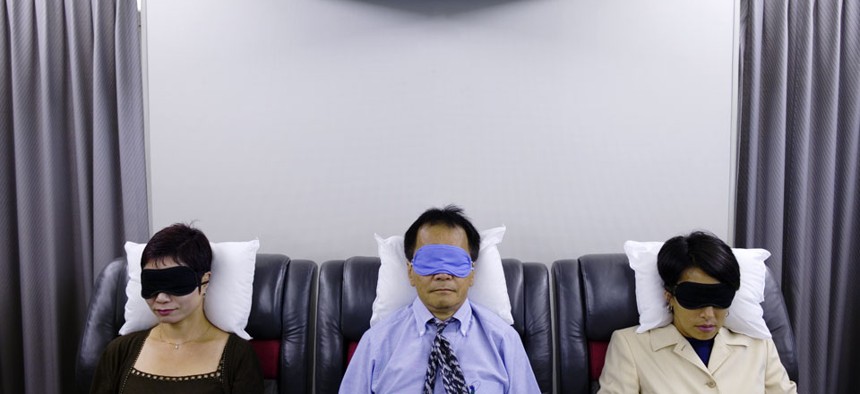
Blend Images/Shutterstock.com
You Can Now Reprogram Your Sleep Patterns With Your iPhone When You Travel
A new app can help you adjust to jet lag and a changing schedule much faster.
Business travelers, factory workers, and grad students all know how hard it can be to regain your circadian rhythm. But a new app is promising to help us plan for, and even shorten, the time it takes to adjust to new time schedules.
Typically, the body can adjust its schedule an hour forward or back each day. This lag means that it’s possible to feel the effects of a trip from New York to Tokyo for nearly two weeks. Using a new app called Entrain could cut 12 days of jet lag down to just three or five, says Daniel Forger, a biomathematician and the project’s lead researcher. “It’s up to you whether you want to focus those 3-5 days before or after you travel,” he told Quartz.”If you have an important meeting, or if you are a musician or athlete, you probably want to adjust beforehand.”
The effects of light on the circadian clock have been well studied, and researchers have generated vast amounts of data showing how exposure to light at different times of the day can shift your internal clock forward or backward. “There have been enough studies in people that they have an idea of the curve,” says Roberto Refinetti, of the Circadian Rhythm Laboratory in South Carolina, who was unaffiliated with this research.
To create Entrain, Forger and his colleagues from the University of Michigan fed those figures into a single mathematical model. The app (only on iOS for now), starts by having you enter your current time zone. When you have a trip coming up, you put in the destination and time of arrival. Based on the maximum amount of light (from dim office to full sunlight) you think you’ll experience throughout most of the day, Entrain tells you what kind of light exposure you’ll need to ease you into a new sleep schedule.
The app adapts, too. Once you’ve made your schedule, you can adjust the light levels on an hourly basis, so if you sleep through your alarm, or step outside for an hour of sunbathing, you can let it know and it will adjust your schedule. To keep track of your progress, Entrain also has a flow graphic so you can visualize how your current schedule is synching up to your target schedule. Finally, there’s an option to submit your data to Forger and his team, so they can continue to improve their work.
That’s important because, as Refinetti points out, Forger’s mathematical model is pretty theoretical at this point. “Dan Forger is a respected mathematician who has done a lot of work on models of the circadian system,” he says. “But, I would like to see how the results work with real patients.”
The circadian clock—which is controlled by a gland in your brain known in the sleep business as “the pacemaker”—is thought to have evolvedto regulate the amount of energy we use throughout the day, because even before we had airplanes and exams to screw up our sleep schedules, our bodies had to accommodate to seasonal fluctuations in light. Lifestyles that are abusive to the circadian clock have been linked to problems including obesity, heart problems, constipation, and cancer.
Reprinted with permission from Quartz. The original story can be found here.
(Image via Blend Images/Shutterstock.com)
NEXT STORY: Senator: Even Small Agencies Need Watchdogs







